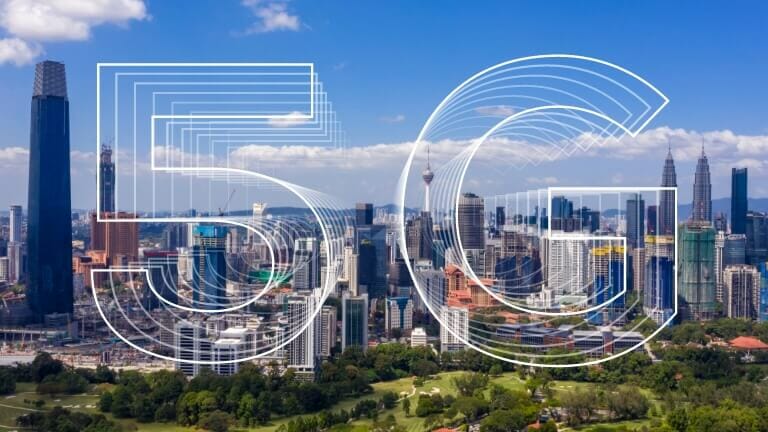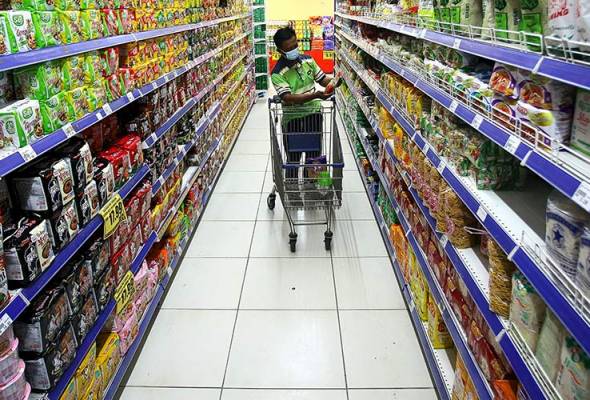
Published in Astro Awani, TheStar, MYsinchew, Sinar Harian image by Astro Awani.
The locally produced movie “Mat Kilau” has certainly made history by collecting a record revenue, for the Malaysian filmmaking industry, in a record time, pointing to a sensational viewership outreach. But, at the same time, the salient single-dimensionality of the movie in the sense that it portrayed every non-Malay character as a villain helping the British colonialists plotting and committing their atrocities against the Malays causes serious concerns for its consequences to the unity and harmony of our multi-ethnic nation. And this is at the moment when the nation needs that unity the most to defend its land once again from colonialists – only, this time, elite political supremacists-colonialists.
More so, some viewers may have difficulties seeing the film as a work of fiction, while the disclaimer at the beginning of the film that movie scenes are only partially based on actual historical events is insufficient, as pointed out by the experts in Malay history.
Also, given Malaysia’s colourful history of identity politics, it is possible to foresee how “Mat Kilau” subtle references and misleading tropes (intended or not) and quotes can be used for all the wrong reasons when election season is around the corner.
Therefore, the film requires a very critical assessment by the viewers. The works of fiction, at best, are meaningless if we fail to interpret and relate them properly to events unfolding around us.
Apart from drawing the line between fiction and historical reality, the movie calls for a proper understanding of two essential concepts – colonisation and patriotism. Both are as relevant as ever to the current local context. With this critical backdrop, some of Mat Kilau’s catchy quotes receive a new meaning for all Malaysians, irrespective of their ethnicity and religion.
Colonisation and its hidden forms
Colonisation is a way of establishing control over a social group to appropriate their territory, wealth, and human resources for one’s own use.
Everyone knows the most prominent and brutal but unstable form of exerting control – using military weaponry.
However, since ancient times there were selected few who were privy to the knowledge of other subtle and, therefore, more powerful and challenging to ward against means of manipulation and control. The figure below presents the spectrum of such tools classified into six groups or levels.
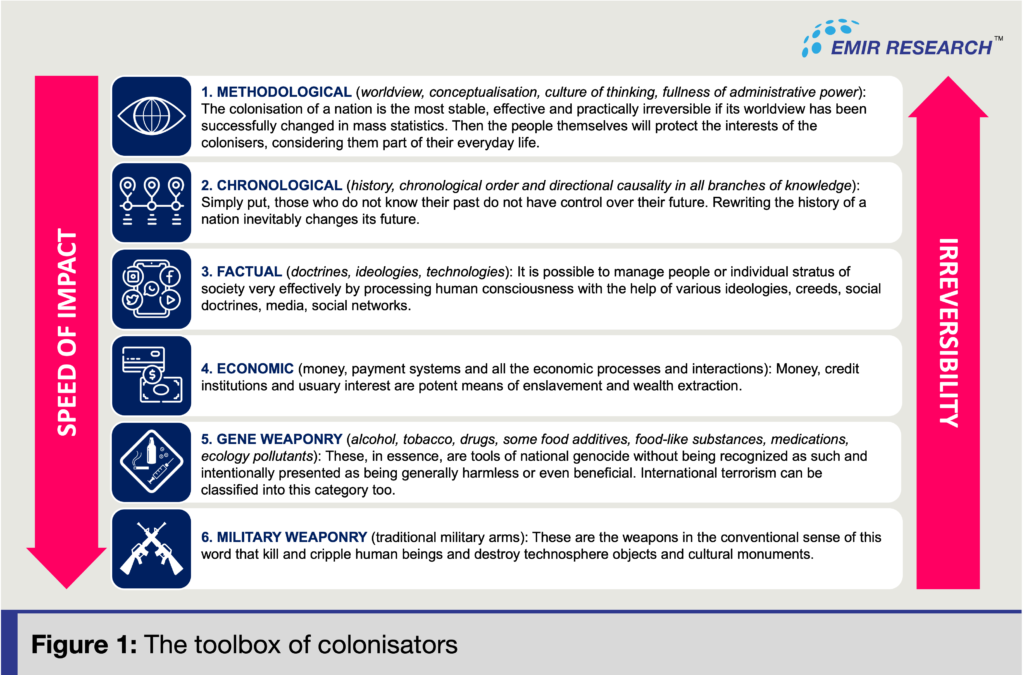
In Figure 1, note how these means of manipulation vary in speed and power of their impact or irreversibility. Using economic means or gene weaponry and more so military weapons are quick to give the desired effects to the coloniser. However, they are also the most apparent forms to those who are manipulated and therefore are more likely to encounter strong resistance.
On the contrary, other more subtle forms of manipulation — of people’s worldview, the culture of thinking, historical facts, doctrines, and ideologies — require a long implementation time frame. However, once taken roots in society, they are almost impossible to fight, at least as long as they remain unseen to the larger proportion of the manipulated social group.
Throughout history, various countries in and out have been subject to colonisation by foreign intruders. But they are also equally often subject to the “domestic colonisation” by their own political elites and entrenched corrupt establishments through mainly those subtle forms of control (manipulating people’s worldview, history, ideologies etc.) to continue the appropriation of people’s resources and impoverishing the nation.
Patriotism as a universal spiritual value
Patriotism is an indispensable and universal spiritual value of humanity which is simply inseparable from a heightened sense of justice in full respect of the most universal human value — the dual value of life (our own life and the lives of others).
There is an astronomic distance between patriotism and nationalism (which in its harmless form is not bad) and, more so, outright ethnic/religious chauvinism – the most radical form of nationalism preaching racial exclusivity and inciting national enmity and hatred.
The element of unity and genuinely shared prosperity where every citizen is given dignity, a helping hand is extended based on needs and respect is given based on merits is incredibly strong in patriotism due to its heightened spiritual level. However, this element can be absent or easily dampened in nationalism under skilful manipulation by foreign or domestic colonisers.
Importantly, patriotism also encompasses spiritual and moral capability to counteract harmful, evil, negative and destructive tendencies in the world, one’s own country or any narrower social group.
Therefore, a true patriot, in one’s defining spiritual-moral-ethical integrity, possesses the following qualities:
- Able to see beyond the illusory perception of social reality;
- Oriented towards the balance between integration and preservation of national and cultural diversity;
- Able to detect the multidimensional substitution of spiritual values and meanings.
In other words, for a patriot, it is essential to differentiate those subtle means of manipulating the nation’s shared consciousness (see Figure 1) because, unfortunately, colonisation is often done under the most patriotic slogans. The control is easier to exert if true patriotic values are lost, diluted and substituted.
When the bough breaks
The above colonial methods of manipulation (see Figure 1) are only powerful as long as they remain unseen by the majority. However, as the saying goes, there is nothing hidden that is not shown.
Colonialism, foreign or domestic, always aims to extract resources in colonialists’ narrow interests but not the nation. And this extraction of resources, if it remains unchecked, will unavoidably lead to what Mat Kilau (as played by Adi Putra) expresses as “sampai bangsaku tiada negara”.
Sadly enough, Malaysia is approaching such a catastrophic state.
The statistics on key indicators of our national development (Figure 2) indicate that if there was any “stability” in the last couple of decades (which significantly intensified since the “bossku” decade) of Malaysia’s governance, then it is only the stability in plundering the national resources for the very few.
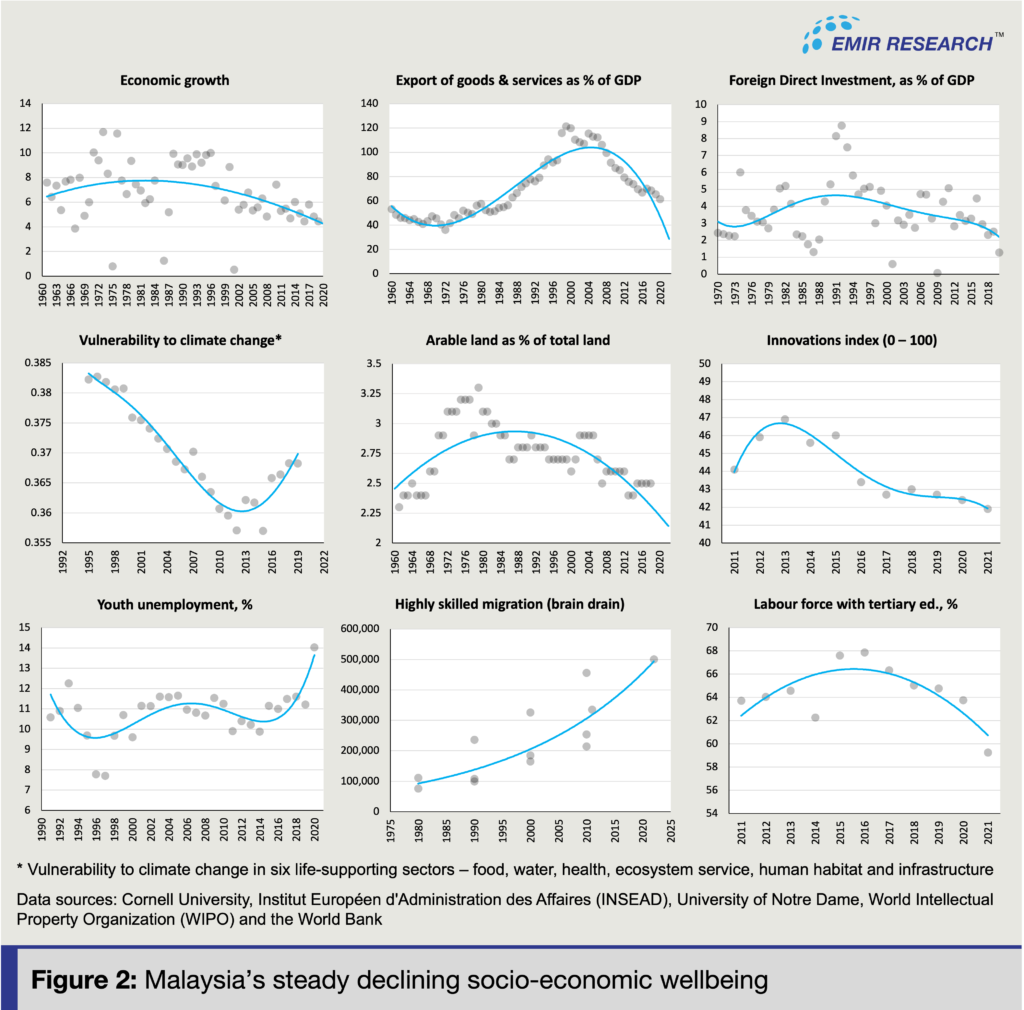
However, how about the Bumiputera, whom these political elite colonialists vouched to protect under the New Economic Policy (NEP) practices and structures initiated in 1971, officially ended in 1991, but, unofficially, stretched far beyond two official decades?
According to empirical data analysis, although relative (proportional change) ethnic income inequality has considerably reduced from the 1970s to 2020, the ethnic income inequality in absolute terms (absolute difference) is higher now than 50 years ago, suggesting that ethnic income inequality has increased.
Similar dynamic can be observed for poverty. According to the World Bank study, in 2004 poverty ratio within the Bumiputera group was 49.1% versus 17.7% and 33.4% within Chinese and Indian groups, respectively, while in 2016, the same statistics for Bumiputera, Chinse and Indians groups were 13.1% (73% reduction), 2.4% (86% reduction) and 7.3% (78% reduction) respectively (refer Figure 3 for visualisation). Notice that the poverty ratio within the Bumiputera group was 2.8 times that of the poverty ratio within the Chinese group in 2004, and this number rose to 5.5 times in 2016. At the same time, Bumiputera’s share of national poverty increased from 81.4% in 2004 to 85.3% in 2016.
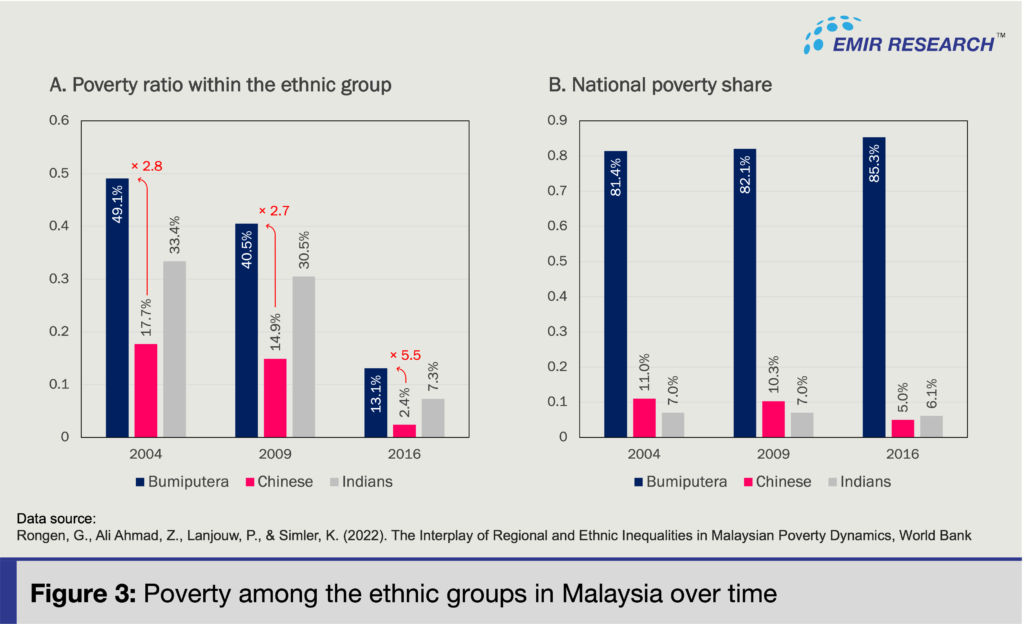
Notably, in these calculations, World Bank used its own poverty line, defined as the 40th percentile of household income per capita in 2004. This line is then kept constant in real terms for subsequent years. This is because Malaysia’s official poverty line was kept too low for far too long.
According to Professor Martin Ravallion, “$4 a day may well have been a sensible line for Malaysia in 1970”. In his estimates, it should have been at least $12 a day already in 2016. However, Malaysia’s official poverty line was updated to just $10 a day only in 2020.
In the same study, using the relative lines that rise with the mean income, Professor Martin found that the national poverty rate in Malaysia, although substantially reduced from 41% in 1984 to 22% in 2016, suggests “a long way go to eliminate poverty” which is strikingly different from Malaysia’s official numbers.
The aforementioned World Bank study, using synthetic panel methodology and comparing 2004 and 2016, found that later in this period it became increasingly difficult to “escape poverty” in Malaysia.
Interestingly, World Bank observed that the bounds of proportional chronic poverty did not narrow over time among rural Bumiputera at all, especially during the “bossku decade” – another significant electoral base of elite political colonialists.
Notably, the empirical data also suggests that the impact on the national poverty rate of redistribution from the Chinese to the Bumiputera was high around the time the NEP was introduced. However, over time the effect declined considerably, and, as suggested by other statistics above, this is not due to the elimination of poverty.
So, where did the real redistribution happen then?
Another empirical work reveals that “the Bumiputera in the top income group (the top 1% and the 10%) benefited the most from economic growth”, as observed over the period 2002 to 2014, while population shares of ethnic groups in these percentiles nearly did not change over the same time frame.
Is this not pure domestic colonialism?
All the above statistics are irrefutable facts on the outcomes of decades (not years) of colonisation by elite political supremacists riding the ethnic and religious sentiment or identity politics in our country for their survival while giving no importance to nation building.
Are the too graphic scenes from “Mat Kilau” film depicting what colonialists can do appear terrifying to us? Then how about the above statistics? There are millions of personal hardships and tragedies behind every downward slope in these graphs, millions of lives that, if not for the decades of exploitative political elite colonialism, could have shoulder this current unprecedented global crisis better in terms of their health and economic resiliences
Yes, it is important to watch Mat Kilau! However, it must be seen in the bigger sphere of things discussed above. Watching Mat Kilau and crying but not making the right decision for your country has little value.
Dr Rais Hussin is President and CEO at EMIR Research, an independent think tank focused on strategic policy recommendations based on rigorous research.
